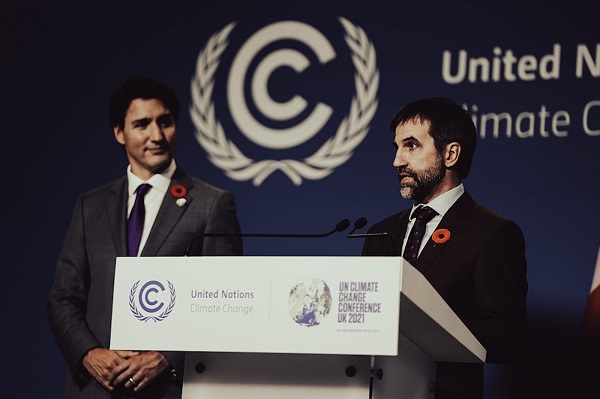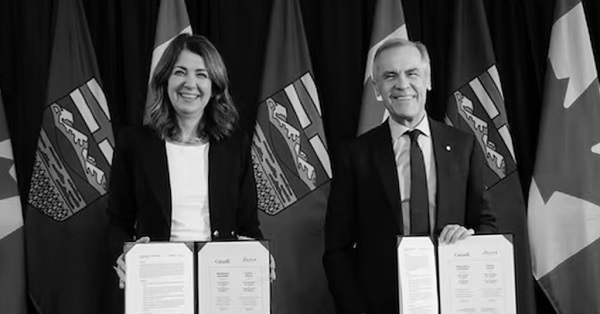Automotive
Northvolt bankruptcy ominous sign for politicians’ EV gamble

From the Canadian Taxpayers Federation
By Jay Goldberg
Northvolt’s bankruptcy and the heavy losses traditional auto manufacturers are seeing on EVs is evidence that betting billions on the industry was a terrible gamble for Trudeau, Legault, and Ontario Premier Doug Ford.
Politicians love to gamble with your cash, but, based on their record, you’d think they were rookies getting fleeced by a card shark at a shady bar.
The latest epic failure is the gamble on electric vehicle battery manufacturer Northvolt.
The Legault government bet buckets of cash. And now the company is broke.
“Northvolt’s liquidity picture has become dire,” reads the Swedish EV battery manufacturer’s bankruptcy protection filing.
It turns out Northvolt accumulated $5.8 billion of debt. It’s CEO just resigned. The company’s future is bleak. New leadership is hoping it can remain afloat with the help of a $100-million loan from one of its shareholders.
Both the government of Quebec and the province’s pension fund bet hundreds of millions of dollars on Northvolt. They bought stakes in the company worth a combined $470 million.
That’s money Quebec taxpayers and pensioners may never get back.
Quebec Economy Minister Christine Fréchette admitted the money is “at risk” and taxpayers will only know if that investment remains intact after the company goes through its bankruptcy process.
As bad as the loss is for Quebeckers, Canadian taxpayers might also soon be facing billions in losses. That’s because Northvolt has a Canadian subsidiary that also received buckets of taxpayer cash.
Northvolt’s Canadian subsidiary is currently building a $7-billion EV battery plant in Quebec. Quebec Premier Francois Legault and Prime Minister Justin Trudeau gave a combined $2.4 billion to Northvolt to build it.
Northvolt says its Canadian subsidiary is funded separately from the global company that was forced to file for bankruptcy and will “operate as usual outside the Chapter 11 process.”
But if the parent company’s finances have spiraled out of control, there’s every reason for taxpayers to worry its Canadian operation will too.
Northvolt repeatedly missed its in-house global production targets this year and curtailed some of its operations in Sweden.
If Northvolt is cutting back on global production, what reason does it have to ramp up production on a new facility in Canada?
With Northvolt’s global finances on the rocks, Canadian politicians might be tempted to throw even more cash at the company’s Canadian operation to keep the company afloat.
But throwing good money after bad isn’t a solution. Politicians in Ottawa and Quebec City need to stop gambling with taxpayers’ money.
Sadly, the implications for taxpayers are much wider than the future of one EV battery company.
Canadian politicians bet $57 billion of taxpayer cash on the EV industry.
But the entire industry is in jeopardy. Other than Tesla, every EV manufacturer is losing money making them.
General Motors lost $3.5 billion on EVs in 2023. The Ford Motor Company lost $7.7 billion. And both of those companies received billion-dollar handouts from the Trudeau and Ford governments to build EVs here in Canada.
The only reason GM and Ford aren’t in Northvolt’s position is because they have gasoline-powered cars to sell that turn a profit, allowing them to balance out their earnings (or lack thereof).
But there are signs of a pull-back.
Ford, for example, cancelled plans to produce two different models of electric SUVs, which were supposed to be built in Canada. This is costing the company billions. Meanwhile, the Canadian plant is pivoting back to building gasoline-powered cars.
Northvolt’s bankruptcy and the heavy losses traditional auto manufacturers are seeing on EVs is evidence that betting billions on the industry was a terrible gamble for Trudeau, Legault, and Ontario Premier Doug Ford.
This is a very expensive lesson: politicians should never gamble with taxpayer dollars by throwing billions at corporations. Businesses don’t need handouts to make investments that make sense.
In all these cases, the financial well-being of Canadian taxpayers should never have been at risk.
Automotive
Power Struggle: Governments start quietly backing away from EV mandates

From Resource Works
Barry Penner doesn’t posture – he brings evidence. And lately, the evidence has been catching up fast to what he’s been saying for months.
Penner, chair of the Energy Futures Institute and a former B.C. environment minister and attorney-general, walked me through polling that showed a decisive pattern: declining support for electric-vehicle mandates, rising opposition, and growing intensity among those pushing back.
That was before the political landscape started shifting beneath our feet.
In the weeks since our conversation, the B.C. government has begun retreating from its hardline EV stance, softening requirements and signalling more flexibility. At the same time, Ottawa has opened the door to revising its own rules, acknowledging what the market and motorists have been signalling for some time.
Penner didn’t need insider whispers to see this coming. He had the data.

Barry Penner, Chair of the Energy Futures Institute
B.C.’s mandate remains the most aggressive in North America: 26 per cent ZEV sales by 2026, 90 per cent by 2030, and 100 per cent by 2035. Yet recent sales paint a different picture. Only 13 per cent of new vehicles sold in June were electric. “Which means 87 per cent weren’t,” Penner notes. “People had the option. And 87 per cent chose a non-electric.”
Meanwhile, Quebec has already adjusted its mandate to give partial credit for hybrids. Polling shows 76 per cent of British Columbians want the same. The trouble? “There’s a long waiting list to get one,” Penner says.
Cost, charging access and range remain the top barriers for consumers. And with rebates shrinking or disappearing altogether, the gap between policy ambition and practical reality is now impossible for governments to ignore.
Penner’s advice is simple, and increasingly unavoidable: “Recognition of reality is in order.”
- Now watch Barry Penner’s full video interview with Stewart Muir on Power Struggle here:
Automotive
The high price of green virtue

By Jerome Gessaroli for Inside Policy
Reducing transportation emissions is a worthy goal, but policy must be guided by evidence, not ideology.
In the next few years, the average new vehicle in British Columbia could reach $80,000, not because of inflation, but largely because of provincial and federal climate policy. By forcing zero-emission-vehicle (ZEV) targets faster than the market can afford, both governments risk turning climate ambition into an affordability crisis.
EVs are part of the solution, but mandates that outpace market acceptance risk creating real-world challenges, ranging from cold-weather travel to sparse rural charging to the cost and inconvenience for drivers without home charging. As Victoria and Ottawa review their ZEV policies, the goal is to match ambition with evidence.
Introduced in 2019, BC’s mandate was meant to accelerate electrification and cut emissions from light-duty vehicles. In 2023, however, it became far more stringent, setting the most aggressive ZEV targets in North America. What began as a plan to boost ZEV adoption has now become policy orthodoxy. By 2030, automakers must ensure that 90 per cent of new light-duty vehicles sold in BC are zero-emission, regardless of what consumers want or can afford. The evidence suggests this approach is out of step with market realities.
The province isn’t alone in pursuing EV mandates, but its pace is unmatched. British Columbia, Quebec, and the federal government are the only ones in Canada with such rules. BC’s targets rise much faster than California’s, the jurisdiction that usually sets the bar on green-vehicle policy, though all have the same goal of making every new vehicle zero-emission by 2035.
According to Canadian Black Book, 2025 model EVs are about $17,800 more expensive than gas-powered vehicles. However, ever since Ottawa and BC removed EV purchase incentives, sales have fallen and have not yet recovered. Actual demand in BC sits near 16 per cent of new vehicle sales, well below the 26 per cent mandate for 2026. To close that gap, automakers may have to pay steep penalties or cut back on gas-vehicle sales to meet government goals.
The mandate also allows domestic automakers to meet their targets by purchasing credits from companies, such as Tesla, which hold surplus credits, transferring millions of dollars out of the country simply to comply with provincial rules. But even that workaround is not sustainable. As both federal and provincial mandates tighten, credit supplies will shrink and costs will rise, leaving automakers more likely to limit gas-vehicle sales.
It may be climate policy in intent, but in reality, it acts like a luxury tax on mobility. Higher new-vehicle prices are pushing consumers toward used cars, inflating second-hand prices, and keeping older, higher-emitting vehicles on the road longer. Lower-income and rural households are hit hardest, a perverse outcome for a policy meant to reduce emissions.
Infrastructure is another obstacle. Charging-station expansion and grid upgrades remain far behind what is needed to support mass electrification. Estimates suggest powering BC’s future EV fleet alone could require the electricity output of almost two additional Site C dams by 2040. In rural and northern regions, where distances are long and winters are harsh, drivers are understandably reluctant to switch. Beyond infrastructure, changing market and policy conditions now pose additional risks to Canada’s EV goals.
Major automakers have delayed or cancelled new EV models and battery-plant investments. The United States has scaled back or reversed federal and state EV targets and reoriented subsidies toward domestic manufacturing. These shifts are likely to slow EV model availability and investment across North America, pushing both British Columbia and Ottawa to reconsider how realistic their own targets are in more challenging market conditions.
Meanwhile, many Canadians are feeling the strain of record living costs. Recent polling by Abacus Data and Ipsos shows that most Canadians view rising living costs as the country’s most pressing challenge, with many saying the situation is worsening. In that climate, pressing ahead with aggressive mandates despite affordability concerns appears driven more by green ideology than by evidence. Consumers are not rejecting EVs. They are rejecting unrealistic timelines and unaffordable expectations.
Reducing transportation emissions is a worthy goal, but policy must be guided by evidence, not ideology. When targets become detached from real-world conditions, ideology replaces judgment. Pushing too hard risks backlash that can undo the very progress we are trying to achieve.
Neither British Columbia nor the federal government needs to abandon its clean-transportation objectives, but both need to adjust them. That means setting targets that match realistic adoption rates, as EVs become more affordable and capable, and allowing more flexible compliance based on emissions reductions rather than vehicle type. In simple terms, the goal should be cutting emissions, not forcing people to buy a specific type of car. These steps would align ambition with reality and ensure that environmental progress strengthens, rather than undermines, public trust.
With both Ottawa and Victoria reviewing their EV mandates, their next moves will show whether Canadian climate policy is driven by evidence or by ideology. Adjusting targets to reflect real-world affordability and adoption rates would signal pragmatism and strengthen public trust in the country’s clean-energy transition.
Jerome Gessaroli is a senior fellow at the Macdonald-Laurier Institute and leads the Sound Economic Policy Project at the BC Institute of British Columbia
-

 Business2 days ago
Business2 days agoRecent price declines don’t solve Toronto’s housing affordability crisis
-

 Censorship Industrial Complex2 days ago
Censorship Industrial Complex2 days agoA Democracy That Can’t Take A Joke Won’t Tolerate Dissent
-

 Daily Caller2 days ago
Daily Caller2 days agoTech Mogul Gives $6 Billion To 25 Million Kids To Boost Trump Investment Accounts
-

 Business2 days ago
Business2 days agoOttawa’s gun ‘buyback’ program will cost billions—and for no good reason
-

 MAiD21 hours ago
MAiD21 hours agoFrom Exception to Routine. Why Canada’s State-Assisted Suicide Regime Demands a Human-Rights Review
-

 Business2 days ago
Business2 days agoCanada’s future prosperity runs through the northwest coast
-

 Business1 day ago
Business1 day agoNew Chevy ad celebrates marriage, raising children
-

 Alberta1 day ago
Alberta1 day agoThis new Canada–Alberta pipeline agreement will cost you more than you think










